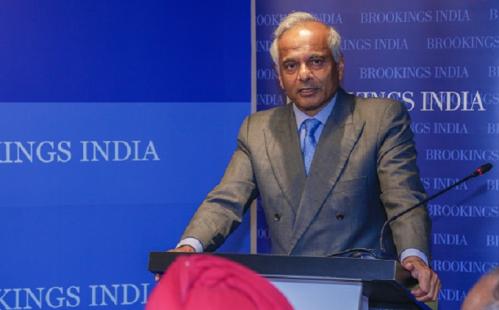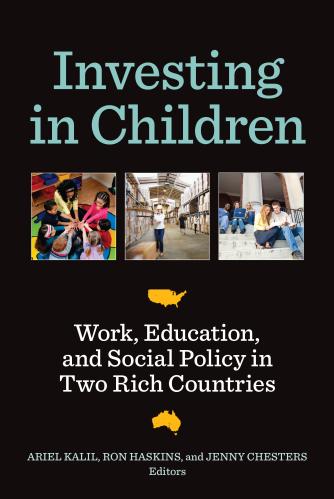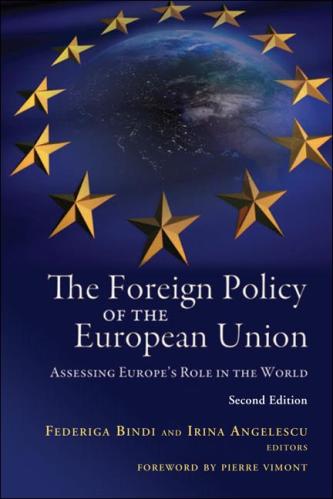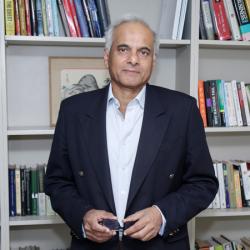Content from the Brookings Institution India Center is now archived. After seven years of an impactful partnership, as of September 11, 2020, Brookings India is now the Centre for Social and Economic Progress, an independent public policy institution based in India.
This article first appeared in The Indian Express. The views are of the author(s).
I was in the US last week for Commencement Week — when students receive their degrees. The tradition is to surround this occasion with speeches by luminaries, faculty and staff, and to have much revelry. As I have two daughters studying in the Boston region and one of them was graduating, I had the occasion to listen to commencement addresses by Hilary Clinton, Joe Biden, John Kerry, Mark Zuckerberg and former acting attorney general Sally Yates (she was summarily dismissed by Donald Trump for challenging his order to ban immigrants from select Muslim countries). I also met with faculty and conversed with my daughters’ friends and professors.
The speeches were powerful and inspiring; some were moving. All contained the message that the class of 2017 had an obligation and a responsibility to look beyond themselves, to engage with the world, to help tackle the challenges of global inequity, social injustice, pandemics, extremism and climate change. Marc Zuckerberg called on his generation to address these issues with a renewed sense of purpose; Hilary Clinton issued a clarion call for students to enter public service to protect society against the assault on reason, inclusiveness and diversity. Joe Biden forewarned against confusing academic credentials and social sophistication with “gravitas and judgment” and drew on a deeply moving personal tragedy to caution against “ambition without perspective”. As he said, “reality has a way of intruding”.
Many of these messages were built around the notion that America was the lodestar for the global community. That, without its leadership, the world would lose its moorings. Joe Biden was particularly unsubtle; he decried those who forecast America losing out to China. He dismissed the commentators’ prognosis with a shrug, and the words “give me a break”. The public declamations of students and faculty contained comparable social messages, albeit without jingoistic overtones.
I will admit I was impressed, and, on occasion, overwhelmed by the power of the oratory and the beauty of the language. And I felt optimistic about the future; for, if indeed these, the best and brightest of society, were ready to get off the treadmill of personal aggrandisement and dedicate their lives to social causes, then the current tide of nativism and demagogic extremism can and would be turned back. But that was then.
On my return to India and in the quiet of my study, reality intruded. I picked up the papers to read about the debate surrounding cow slaughter, triple talaq and the comments of our army chief that he would be happier if instead of stones, Kashmiris would shoot bullets, because then his “boys” could respond in like measure unhesitatingly. I read about the latest Trump-ism and mulled over the view expressed by a distinguished professor that Trump, like so many other global leaders, suffered from what psychiatrists term “narcissistic personality disorder” (NPD). Wikipedia defines NPD as a personality trait characterised by “exaggerated feelings of self-importance, an excessive need for admiration and a lack of understanding of others’ feelings. People affected by it often spend a lot of time thinking about achieving power or success or about their appearance”.
I was reminded of the deep divisions in our society and the anger of those disenfranchised by the forces of globalisation, liberalisation and technology. I realised that however exalted the humanist and liberal sentiments expressed during Commencement Week, these were not universally shared sentiments; there was a wide swathe of people beyond the limits of liberal East Coast elite US institutions that held a radically different view of the world and little had been done or said during the past week to understand this worldview.
My optimism faded and I looked back on Commencement Week with a somewhat more jaundiced perspective. I felt that the university authorities had done the students a disservice by not inviting anyone from the other side — such an invitee would certainly not have struck a popular chord but he would have been heard. One African-American student, Jonathan Roberts, received a standing ovation from his peers by pointing out, in language and tone reminiscent of Martin Luther King, that Harvard’s “education had not prepared us to understand… the authenticity of others’ pain…. (that) change will not come from us… (because) we will not sacrifice our (advantaged) place in the system… that we are not ready to inherit this world (and that we will)… inevitably become the political leaders we claim to despise”.
The world is a risky place — and getting riskier. This is, in large part, because of the revolt against the establishment elite and the consequent democratic emergence of the alpha male political leader; some might say, those with NPDs. There are many such leaders, both in government and opposition. Trump is the most notable. They have much in common: All run their organisations (government or otherwise) with a tight fist, as if these were private fiefdoms or businesses. All have limited regard for institutional checks and balances. All are paranoid about loyalty.
Trump, for instance, sent his long-time bodyguard Keith Schiller to deliver the letter of dismissal to then-FBI chief James Comey. And all are also susceptible to flattery. Saudi Arabia is currently Trump’s best friend because they welcomed him with jet fly-overs, billboards all over Riyadh and images of him with King Salman projected on the walls of his hotel.
The class of 2017 can help reduce this risk if they work to stanch the anger that has brought about such leadership. Their focus should not be the individual. People did not vote for Trump — they voted against the archetypical establishment figure. Their focus should be systemic causes. They should interpret the call to public service and social engagement as a route to address these causes and to deploy their talent to create a bridge to narrow the current social, economic and political divide. The liberal East Coast US universities can facilitate this endeavour by inviting a more diverse group to speak at their future commencements.










Commentary
Op-edOver The Barrel: A note to the class of 2017
June 5, 2017